Dentures – Springfield, IL
Creating Beautiful, Finished Smiles

Advanced gum disease, tooth decay, and accidents or injuries can result in tooth loss, causing the remaining ones to shift and misalign. This not only affects the appearance of your smile, but can also lead to difficulties in biting and chewing. Fortunately, our team is here to address your tooth replacement needs.
When you choose dentures in Springfield, you'll receive personalized care to restore both confidence and functionality. Our custom restorations are designed to align your natural teeth, providing the necessary shape and tone to your cheeks and jaw, preventing a sunken or drawn appearance. Take the first step toward restoring your smile by scheduling an appointment with us today!
Who Is a Good Candidate for Dentures?
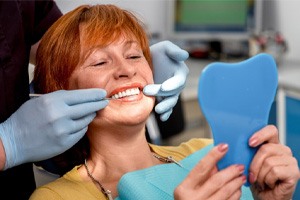
Dentures are far more versatile than you might think – they can replace several missing teeth scattered throughout your mouth or a whole row. During your initial consultation, we’ll check your mouth and discuss the best options for you based on your lifestyle. It's incredibly important to replace missing teeth quickly to avoid future problems like gum disease and decay. Addressing tooth loss early on will keep your mouth healthy in the long run!
Types of Dentures
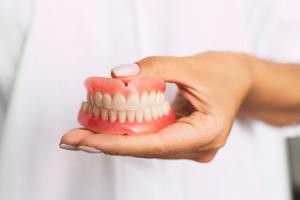
Dentures are an excellent solution for patients with one or more missing teeth, restoring full function to their smiles. Thanks to advancements in dentistry, modern dentures not only look natural, but also provide enhanced comfort. Based on your specific dental needs, our team will suggest one of the following:
Partial Dentures
Partial dentures are made with a gum-colored acrylic base, typically reinforced with metal. This base is custom-designed to snugly fit around your existing teeth, securing the replacements in position to fill gaps across your arch. The convenience of removability makes partial dentures easy to clean.
Full Dentures
Traditional full dentures can restore an entire set of teeth by adhering to the jawbone and gums through suction. These dentures have a realistic, gum-colored acrylic base along with porcelain or ceramic prosthetic teeth, significantly enhancing bite strength and overall quality of life.
Implant Dentures
Implant dentures combine the best qualities of traditional dentures and cutting-edge dental implants. Rather than relying on clasps or natural suction to secure your new smile, this restoration is affixed to a titanium post surgically inserted directly into your jawbone. This approach ensures maximum stability, eliminating any unwanted movement for a more secure and reliable solution.
How Dentures Are Made

Today’s dentures aren’t like the ones that your grandparents used to wear. They are customized for each patient. This allows for additional comfort and a natural appearance that makes you feel confident. To achieve this, getting dentures requires a multistep process. Everyone’s treatment looks a little bit different, but here is what one can generally expect.
What Are Dentures Made Of?

Dentures are comprised of two separate parts: the base and the replacement teeth. Here is what each of them looks like:
- Base: The base is the foundational structure of the replacement teeth. It can be made from many different materials, like acrylic, nylon, porcelain, resin, and metal. Acrylic tends to be the most common material because it is easily tailored to match your gum tissue, leaving you with a natural appearance.
- Teeth: The replacement teeth are generally made from resin or porcelain because they look very similar to natural tooth enamel – even in the way that they reflect light. Porcelain is a more popular option for full dentures because it is more durable.
The Denture Creation Process

Dentures are custom-made for each person. This requires multiple steps to achieve. Everyone’s treatment looks a little bit different, but here are the main steps to be expected.
- First, your dentist will take measurements of your jaw and impressions of your upper and lower gums. This is used to make a plaster model of the mouth. It is used to ensure that your final denture fits perfectly.
- The model is sent to the dental lab. This is where your dentures are made. First, your replacement teeth are set into place using a mechanical device known as an “articulator.” Adjustments are then made by a lab technician.
- The wax dentures are sent back to your dentist for a fitting. If everything looks good, they are returned to the dental lab to complete the process.
- Once your dentures are returned to the dental lab, the wax needs to be replaced with acrylic. To do this, the lab technician places the dentures into a flask. Plaster is poured into the flask to maintain the shape of the dentures. Then, the entire flask is placed in hot water to melt away the wax.
- The plaster is cut away from the dentures using dental tools. The dentures are placed into an ultrasonic bath to wash away the rest of the plaster.
- Excess acrylic is cut from the dentures. Then, the dentures are polished to perfection.
- Now that your dentures are ready, you can return to the dental office so you can try them on. If you are your dentist are both happy with the results you can leave the practice showing off your new and improved smile!
Adjusting to Your New Dentures

After you get your new dentures, you will likely experience some soreness, but this isn’t something to worry about. Temporary discomfort is common as one adjusts to their new prosthetic. Your dentures will soon start to feel more and more natural. When you first get your dentures, it’s a good idea to stick to softer foods and exercise your facial muscles. If discomfort persists or you have concerns, don’t hesitate to contact us so we can help!
Benefits of Dentures

Losing multiple teeth can complicate simple tasks like chewing, speaking clearly, and feeling confident in your smile. But don't worry – dentures are here to change the game. Whether you're missing several or all of your teeth, dentures offer a life-changing solution, vastly improving your quality of life. If you've been struggling with tooth loss, dentures can revitalize your smile and bring a host of benefits.
Psychological Benefits

When patients lose their teeth, it's common to grapple with feelings of insecurity and discomfort, which can take a toll on self-esteem and social interactions. Some may even withdraw from social engagements, leading to feelings of sadness and depression. However, by embracing dentures to restore both the look and function of their smile, patients often find a significant boost in confidence. Dentures address concerns about appearance, speech clarity, chewing ability, and more, ultimately fostering a more positive outlook on life.
Clearer Enunciation

When teeth are missing, speaking can become tricky since clear pronunciation depends on the precise placement of the lips and tongue. Without teeth to touch the tongue to, articulating certain words may prove difficult. Thankfully, dentures serve as effective replacements, enabling wearers to speak more clearly. With a short adjustment period and some practice, speaking will feel natural once more.
Improves Nutrition

Lots of nutritious foods like vegetables, fruits, and proteins come with a tough texture. Unfortunately, tooth loss can make chewing thoroughly a challenge, which can lead to issues like indigestion or malnutrition. By improving chewing ability, dentures empower patients to indulge in a broader range of nutritious foods. This ensures the body receives the essential nutrients crucial for overall health and well-being.
Preserves Oral Health

Choosing dentures, especially if you have remaining natural teeth, can prevent them from shifting and creating problems elsewhere in your mouth. Furthermore, dentures assist in evenly distributing chewing forces to lessen the strain on your remaining natural teeth.
Expands Opportunity

Your smile is typically the initial focal point in social interactions, job interviews, and professional endeavors. Making a strong first impression can greatly influence success, particularly in career advancement and sales. A complete and confident smile is pivotal in this regard, instilling self-assurance and approachability. Whether in personal or professional settings, having a complete smile proves to be a valuable asset, bolstering overall confidence and opening doors to success.
What Makes Our Custom Dentures Better Than Traditional Dentures?

Our focus is on delivering a custom, cosmetically superior, and more lifelike and natural-looking smile – instead of the stamped-out “denture look”. Each set is individually hand-crafted by highly trained, local denture technicians with a specific and detailed prescription from the doctor. Plus, smile-lifting technology is utilized to achieve a more youthful appearance.
The tissue color of the denture is matched to your existing gums and facial complexion. Our dentures are injection-molded and heat and pressure-cured, which reduces the sizes of the pores in the material. This allows for improved polishing of the denture, which results in less staining and less opportunity for bacteria and plaque to grow, making the denture more odor-resistant. You will be intimately involved in the customization of your new restoration to ensure you get results you’re happy with.
How Dentures Are Made
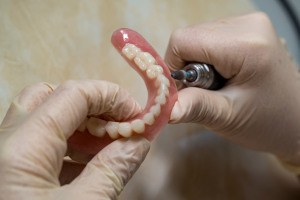
Today’s dentures aren’t like the ones that your grandparents used to wear. They are customized for each patient. This allows for additional comfort and a natural appearance that makes you feel confident. To achieve this, getting dentures requires a multistep process. Everyone’s treatment looks a little bit different, but here is what one can generally expect.
What Are Dentures Made Of?
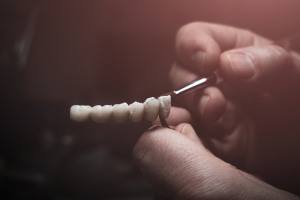
Dentures are comprised of two separate parts: the base and the replacement teeth. Here is what each of them looks like:
- Base: The base is the foundational structure of the replacement teeth. It can be made from many different materials, like acrylic, nylon, porcelain, resin, and metal. Acrylic tends to be the most common material because it is easily tailored to match your gum tissue, leaving you with a natural appearance.
- Teeth: The replacement teeth are generally made from resin or porcelain because they look very similar to natural tooth enamel – even in the way that they reflect light. Porcelain is a more popular option for full dentures because it is more durable.
The Denture Creation Process
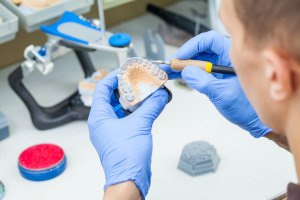
Dentures are custom-made for each person. This requires multiple steps to achieve. Everyone’s treatment looks a little bit different, but here are the main steps to be expected.
- First, your dentist will take measurements of your jaw and impressions of your upper and lower gums. This is used to make a plaster model of the mouth. It is used to ensure that your final denture fits perfectly.
- The model is sent to the dental lab. This is where your dentures are made. First, your replacement teeth are set into place using a mechanical device known as an “articulator.” Adjustments are then made by a lab technician.
- The wax dentures are sent back to your dentist for a fitting. If everything looks good, they are returned to the dental lab to complete the process.
- Once your dentures are returned to the dental lab, the wax needs to be replaced with acrylic. To do this, the lab technician places the dentures into a flask. Plaster is poured into the flask to maintain the shape of the dentures. Then, the entire flask is placed in hot water to melt away the wax.
- The plaster is cut away from the dentures using dental tools. The dentures are placed into an ultrasonic bath to wash away the rest of the plaster.
- Excess acrylic is cut from the dentures. Then, the dentures are polished to perfection.
- Now that your dentures are ready, you can return to the dental office so you can try them on. If you are your dentist are both happy with the results you can leave the practice showing off your new and improved smile!
Adjusting to Your New Dentures

After you get your new dentures, you will likely experience some soreness, but this isn’t something to worry about. Temporary discomfort is common as one adjusts to their new prosthetic. Your dentures will soon start to feel more and more natural. When you first get your dentures, it’s a good idea to stick to softer foods and exercise your facial muscles. If discomfort persists or you have concerns, don’t hesitate to contact us so we can help!
Who’s a Good Candidate for Dentures?

Dentures are a time-tested solution for restoring smiles after tooth loss, offering fantastically functional and aesthetic replacements. Whether you're missing a few teeth or an entire arch, dentures can help you regain your quality of life and live more comfortably in many ways. However, not everyone is a perfect candidate for denture appliances, so several factors need to be considered. If you’d like to see how our team at Advanced Dental Care of Springfield will evaluate your mouth to decide if this option is right for you, read more below. If you want to learn more, call us today to schedule your consultation.
Effects of Missing Teeth

Missing teeth can have drastic negative effects on your body and your confidence. Without a full set of teeth, chewing becomes more difficult, potentially leading to nutritional issues if you avoid certain foods. Speech can also be affected, making it harder to pronounce certain words clearly.
Over time, gaps in your smile will also cause your remaining teeth to shift out of place, leading to bite misalignment and even more dental issues. For example, the absence of teeth can lead to jawbone deterioration, as it can no longer get the stimulation it needs. This can eventually cause a sunken facial appearance, making you look much older than you are.
What Are the Qualities of a Great Candidate for Dentures?

A great candidate for dentures typically has significant tooth loss and generally good oral health. Here are some of the other factors we’ll evaluate at your consultation:
- Sufficient Jawbone Density: Candidates need a fair amount of jawbone density to support their new prosthetics.
- Commitment to Treatment: The best denture candidates are those already committed to or who pledge to get serious about their oral health routines.
- Lack of Gum Disease: Patients who want dentures need to have healthy gum tissue to wear dentures comfortably.
- Need for an Affordable Option: Dentures are a lower-cost method for replacing missing teeth. So, if you’re on a tight budget, they may be a better fit for you.
Alternative Tooth-Replacement Options
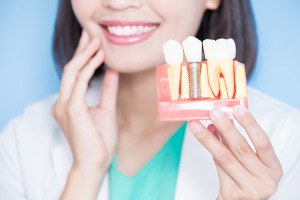
While dentures are a popular choice for tooth replacement, they are not the only option available! Dental implants are a highly effective alternative that provides a more permanent fix by anchoring replacement teeth directly into your jawbone. This creates greater stability and a more natural feel than other options.
Dental bridges are another option, great for patients missing only one or a few teeth in a row. These prosthetics use neighboring teeth for support while filling the gap with false teeth called pontics. Each of these alternatives has its own set of benefits and considerations, and our team can help you figure out the best choice based on your specific needs.
Understanding the Cost of Dentures

It’s a common question that most people ask when considering dentures to replace missing teeth – how much will treatment cost? Identifying the exact price for this type of tooth replacement requires meeting with a member of our team to go over the state of your oral and overall health and crafting a cost estimate based on several factors. You can expect that once we have a clearer idea of how much your new smile will cost, we will discuss ways to use your dental insurance to lower your out-of-pocket expenses as well as alternative payment options to make treatment easier and more affordable.
Factors That Affect the Cost of Dentures

One of the greatest advantages of dentures is that they are fully customizable. However, we cannot dictate how much your new teeth will cost until we see you for a scheduled consultation. This will allow us to fully examine your mouth and decide how best to proceed. Some of the most obvious factors that we will consider when formulating a plan for treatment as well as its costs include:
- How many teeth are you missing?
- Which type of materials will be used to craft your custom dentures?
- Do you need additional forms of treatment to better prepare your mouth for dentures (i.e., gum disease treatment, tooth extraction, etc.)?
Are Implant Dentures More Expensive?
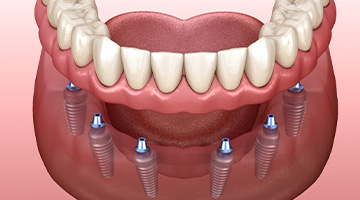
Generally, yes, implant dentures are more expensive than the traditional kind; however, there are some things to consider that might help make it easier to choose these longer-lasting prosthetics. Not only will you spend less in the long run because you won’t need denture adhesive or regular replacement or relinement, but you’ll also enjoy a more permanent solution that is known to last 30+ years. And because implant dentures help to keep the jawbone stimulated, you can worry less about additional treatments needed to improve your facial aesthetics (i.e., facial sagging).
Does Dental Insurance Cover Dentures?
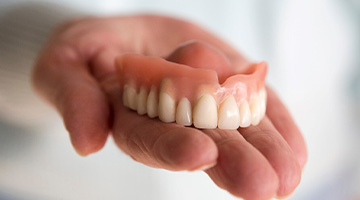
It is possible that your dental insurance company will cover around 50% of the total cost of your dentures. However, you must first meet your annual deductible. Although usually minimal in price, your insurer will not begin to cover more for your treatment until you meet your deductible. It’s important to remember that no two insurance plans are the same, so you should not assume 50% is what they will cover. If you need help, our team will look over your plan and help you navigate ways to get the most out of your policy so that you pay less in the long run.
Other Options for Making Dentures Affordable

Apart from dental insurance, we understand that you may need alternative payment solutions to take care of the cost of your dentures. This is why at Advanced Dental Care of Springfield, we are pleased to offer flexible financing plans through CareCredit and Sunbit. These companies make it easy to apply and enroll in low to no-interest plans so that you can pay it off over time instead of all upfront and out of pocket.
Dentures Maintenance & Aftercare

When you first get your hands on your new set of permanent dentures, you’re sure to appreciate their natural appearance and perfect fit. The best way to make sure they continue working as they’re designed and to extend their lifespan for as long as possible is to follow your dentist’s maintenance instructions, which we’ve included below. If you ever have any questions about caring for your prosthetic, please never hesitate to reach out to our team directly.
Remove Dentures After Eating

Each time you eat, food debris and saliva will combine to create a sticky coating on your dentures. To keep plaque and debris from accumulating and leading to a gum infection, irritation, or other concerns, it’s crucial to remove and rinse your dentures after each time you eat. It only takes a moment and will help keep them from being uncomfortable to wear and developing a smell.
Clean Your Dentures Daily
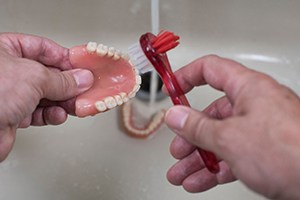
In addition to rinsing your dentures after every meal, you’ll also need to more thoroughly clean them at least once a day. This will help prevent harmful oral bacteria from hardening and coating their surface.
To clean your dentures, you’ll need to use either a special denture brush or a soft-bristled toothbrush, as well as clear hand soap or denture cleanser. Avoid using toothpaste to clean your prosthetic, as this could scratch them and create microscopic crevices for bacteria to hide in.
After you’ve brushed your denture, be sure to rinse them with cool or room temperature water before putting them back in your mouth. Do not use hot water, as this could warp their shape and affect their fit.
Store Your Dentures in a Safe Place

One of the top reasons dentures get damaged is due to them falling and breaking. Whether that’s after you clean them and set them on the slick bathroom countertop or place them in an area that’s easily accessed by children or pets. Be sure to always place your partials in their protective, hard storage case and your full dentures in a glass of water in an area that’s out of reach.
Take Your Dentures Out Before Bed
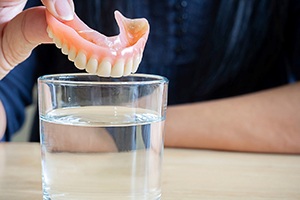
Each night before you go to bed, it’s crucial for you to remove your dentures to give your gums a rest as well as soak them. Place them in a glass of room temperature water or denture soaking solution to help them maintain their shape. Wearing your prosthetic when you sleep can restrict your gum circulation and lead to irritation and inflammation of your gums, making your dentures uncomfortable to wear.
Notice Changes in the Fit of Your Dentures

Dentures need to be relined as your oral anatomy changes in order to ensure they continue functioning properly and fit well. Using poorly fitted restorations could lead to a host of issues, including oral infections, discomfort while eating and speaking, oral sores, and more. If you ever notice that your dentures just don’t feel the same as they used to, call our office so we can make necessary adjustments as needed.
Denture FAQs
Can I Sleep with My Dentures?
When you wear your dentures during the day, the prosthetic tends to cut off circulation to the gums. They can also become a host for bacteria, particularly along the gum line where moisture tends to build up. This means that it’s usually a good idea to take your dentures out to rest periodically.
The best time to do that is while you’re sleeping. For this reason, we recommend leaving your dentures to soak each night in an antibacterial solution.
Is It Hard to Talk with Dentures?
Whenever you make any kind of massive change to your teeth or jaw, it’ll take some time to readjust to speaking properly. This is as true as dentures as it is with anything else.
The exact amount of time that it’ll take to adjust will depend on you. If you are diligent with practicing, taking time to read out loud and speaking slowly, you should be able to speak easily in no time at all. If you find that this is not the case, you may need to talk to us about having your dentures relined so that they fit you a bit better.
Do Upper Dentures Always Cover the Palate?
People taste with more of their mouth than just their tongue. The roof of your mouth is also integral to tasting your food, so if your dentures cover your palate, it could potentially change how food tastes to you.
Fortunately, this isn’t always the case. You can potentially get a horseshoe-shaped denture, similar to what you’d get for your lower jaw, for the upper ridge as well. You can also get implant dentures on your upper ridge, which can skirt this issue as well. Talk to us about your options if you’re trying to get a set of dentures that won’t affect your sense of taste.
Can I Use Regular Toothpaste to Clean My Dentures?
It’s important to brush your dentures daily in order to prevent the buildup of plaque or bacteria on the surface of the prosthetic. However, you shouldn’t use toothpaste to do this.
Toothpaste designed for teeth contains small abrasives used to scrape away plaque. They work well on the teeth but are a bit too hard for the acrylic on your dentures. For this reason, toothpaste could scratch or wear on your prosthetic.
When you clean your dentures, you’ll need to use either a mild hand soap or a specialized denture cleaner. In a pinch, you’re better off just brushing your dentures on their own with just water.
Do Dentures Break Easily?
Dentures are generally durable, but they can break if not handled properly. The materials used, like acrylic or metal, are strong but not unbreakable. Dropping dentures on a hard surface, using excessive force while cleaning, or chewing hard foods can cause them to crack or chip. Additionally, over time, wear and tear or changes in the fit due to gum shrinkage can weaken dentures, making them more prone to breaking.
Proper care, such as storing them in water when not in use and handling them gently, helps prevent breakage. Regular check-ups can also ensure they remain in good condition. If they do break, they can often be repaired by a dental professional.
Are Denture Adhesives Safe?
Yes, denture adhesives are generally safe when used as directed. These adhesives help improve the fit and stability of dentures, providing extra confidence while eating or speaking. Most contain safe, FDA-approved ingredients like zinc or plant-based compounds to create a bond between the denture and gums.
However, it’s important to follow the recommended dosage and consult us if you feel the need for constant adhesive use. If your dentures don't fit properly or frequently come loose, it might be time for an adjustment or a new set.
Can Dentures Become Ill-Fitting?
Yes, dentures can become ill-fitting over time. This is often due to natural changes in your gums and jawbone, which can shrink or change shape after tooth loss. The bone resorption process causes the gums to recede, making dentures feel loose or uncomfortable.
Other factors like weight loss, illness, or changes in dental health can also affect the fit of dentures. Ill-fitting dentures may cause discomfort, difficulty eating or speaking, and even lead to sores or infections in the mouth.
To address this, dentures can be relined, adjusted, or replaced by your dentist. Regular dental check-ups are important to monitor the fit and condition of your dentures, ensuring they remain comfortable and effective.
Can I Reline My Dentures on my Own?
While over-the-counter denture relining kits are available, it's generally not recommended to reline your dentures on your own. DIY kits can provide a temporary fix, but they often lack the precision and durability that a professional relining offers. Improper use of these kits can lead to poor fit, discomfort, or even damage to your dentures.
A dentist or prosthodontist has the necessary tools and expertise to ensure the relining is done accurately, preserving the fit and comfort of your dentures. They use high-quality materials that last longer and are safer for your mouth.
If your dentures are uncomfortable or loose, it's best to consult with us for a proper evaluation and professional relining, rather than attempting a DIY solution.
